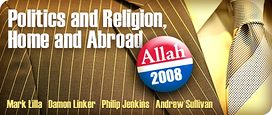One of the strengths of Mark Lilla’s writing is that it makes us explore and confront our assumptions. In some cases, though, I honestly question the basic roots of his argument. I wonder how many historians of Christianity would recognize a characterization like the following:
The ideas and problems of Christian political theology are what shaped the West. Unlike the Hebrew or Muslim God, who delivered a comprehensive law governing all aspects of individual and collective life, the Christian God was a trinity that ruled over a created cosmos and guided human beings by different means: revelation, inner conviction, and the natural order. The Christian picture of the divine was magnificent and allowed a magnificent and powerful civilization to flower. But it was difficult to apply to politics.
I suspect he is retroactively applying post-Enlightenment re-thinkings of Christianity, such as the Anglican “Trinity” of reason, tradition and revelation. If I look at the pre-Enlightenment period though — that is, about 85 percent of Christian history — I see no difference whatever between orthodox, standard, Christian thought and the portrait he offers of Jewish and Muslim doctrine. Christianity too received ” a comprehensive law governing all aspects of individual and collective life” although of course believers argued about the content of this divine law — just like Jews and Muslims, in fact. Historically, Christians were far less potentially “rational” than Mark says, and Muslims and Jews were much more open to arguments from reason and natural law. The fact of being Trinitarian simply did not make Christians more likely to seek a “tripod” of authority — revelation, inner conviction, and the natural order — than people of other religions.
In short, I suggest that his picture of the distinction between the three faiths is seriously exaggerated, and that their commonalities were far more striking at any given period than their differences. The theological differences, in turn, were far too slim to account for “Western distinctiveness”.
My point is that Muslim societies and regimes today may indeed operate from very different assumptions from those of the West, but I would seek quite different causes, and thus different solutions.

